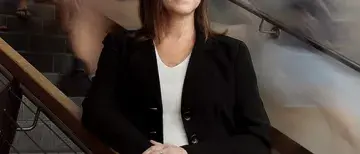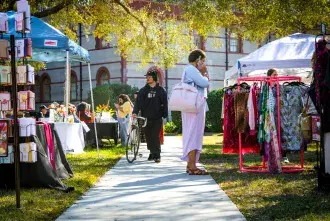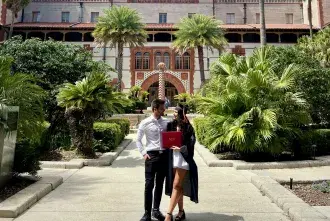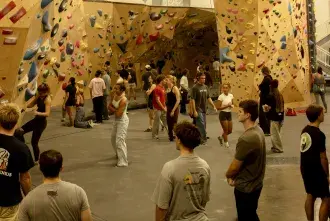
Litzinger, who has a Ph.D. from Embry-Riddle Aeronautical University, studies human factors, which looks at improving products, equipment and environments to better complement human behavior. Her doctoral research was on process inefficiencies in trauma centers that threatened the delivery of critical care. As the world continues to emerge from the COVID-19 pandemic, she will teach a course on “The Science of Crises” next spring. Flagler College Magazine sat down with her recently to talk about the diverse field of psychology and her upcoming course on pandemics.
Q: You are getting ready to teach a class next year on pandemics. Can you tell me a little bit about it, and why you chose that course?
A: Introduction to Psychology has always been a general [education] course offering for years. It's a broad exposure to the science of psychology and all the areas that we impact people's lives. Then you also draw from those classes to pull students, so they potentially major in psychology. Now these new entering freshpersons won't be taking it. So, how do we create courses that make them want to major in our disciplines? The course that I proposed, [Science of Crises: Pandemics], will look at research, social sciences and lessons learned related not just to the most recent pandemic, COVID-19, but to past ones as well.
Q: How are you going to bring these real-world experiences into the classroom?
A: First, we always drive to create courses that address real-time, real-world problems. We aren't stuck in a vacuum and pretend like these things aren't happening outside of the campus walls. A pandemic class sounds great. I was also seeing courses being developed within colleges and universities addressing some of the pandemic issues. From the biology of what a virus is and the science to the technology, I was wanting to introduce a class that was specific to social scientific inquiry. I was like hey, I'll do a class on pandemics and bring all the research and tools that's out there." It's endless and constantly changing.
Q: Are you pulling outside speakers into the course?
A: I'm going to have to bring in folks that are out there working in the trenches, the front lines. My hope is to maybe bring someone in from emergency management. Think about this as a crisis class. Let's dissect this. Bring in people from public health, our Natural Sciences department. Right in the beginning of the pandemic I listened to a webinar presented by the Human Factors Ergonomics Society. These are folks in my field talking about how to keep health care workers in the hospitals safe and protected and in addition to that, patient safety. I just remember listening to that webinar right in the beginning, when we were first recognizing being in a pandemic, and just admiring my field really coming to the forefront to address safety issues and the quality of the process.
Q: How will this course bring in thoughts outside of COVID-19?
A: This course will be bringing in the history of pandemics. So, even though this world is changing so much and the research is trying to keep up, we also have a history to look back on and lessons learned. Not only do we have the Black Plague and the Spanish Flu, which are what some people are comparing us to now, but you also have the AIDS crisis that we're still learning from. Even though we may not have all of the answers, we can reflect and see how we can go about future issues. I think looking back, if you can understand what happened in the past, that can help us in the future on how we can get closer and closer to getting it right.
Q: How do you see public spaces, or how we view them, changing due to the pandemic?
A: Here we've been in a pandemic and have been isolated. In coffee shops, I'm more likely to sit outside or next to the door to feel more comfortable. So, our social lives and the places we eat – being so ingrained in our daily lives and society – we've been stripped of that the last two years. Our outside spaces have become really important. We're lucky here in Florida because we can still go outside, but in northern areas we don't have those luxuries. What do we do when you don't have a place that's safe? That leads to a dramatic decline in mental health and that's our next pandemic. We're dealing with higher rates of suicide of young adults. Isolation, high anxiety, depression – this pandemic has made it worse. If we can't have our outside spaces, what do we do?
Q: Why is this an important topic for students?
A: Here they're being presented with an issue that has impacted all of us. For these students, part of their high school career has been part of a pandemic. So, we've all been impacted by it – and this can go for any sort of issue. These are issues that impact society in varying degrees. Some people may be more impacted by them than others. At the end of the day the field of psychology has an opportunity to make a difference by being on the frontlines of the issues. Psychology may not solve all the problems, but we can at least make a dent.



